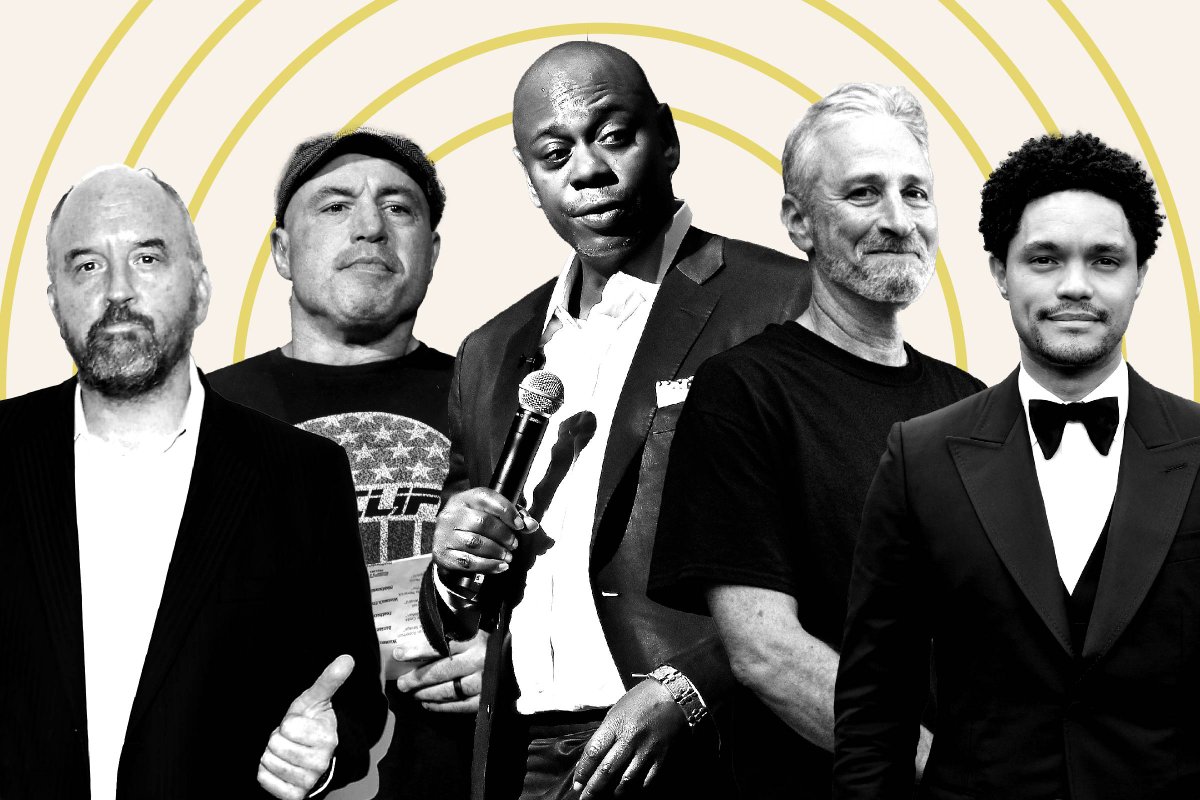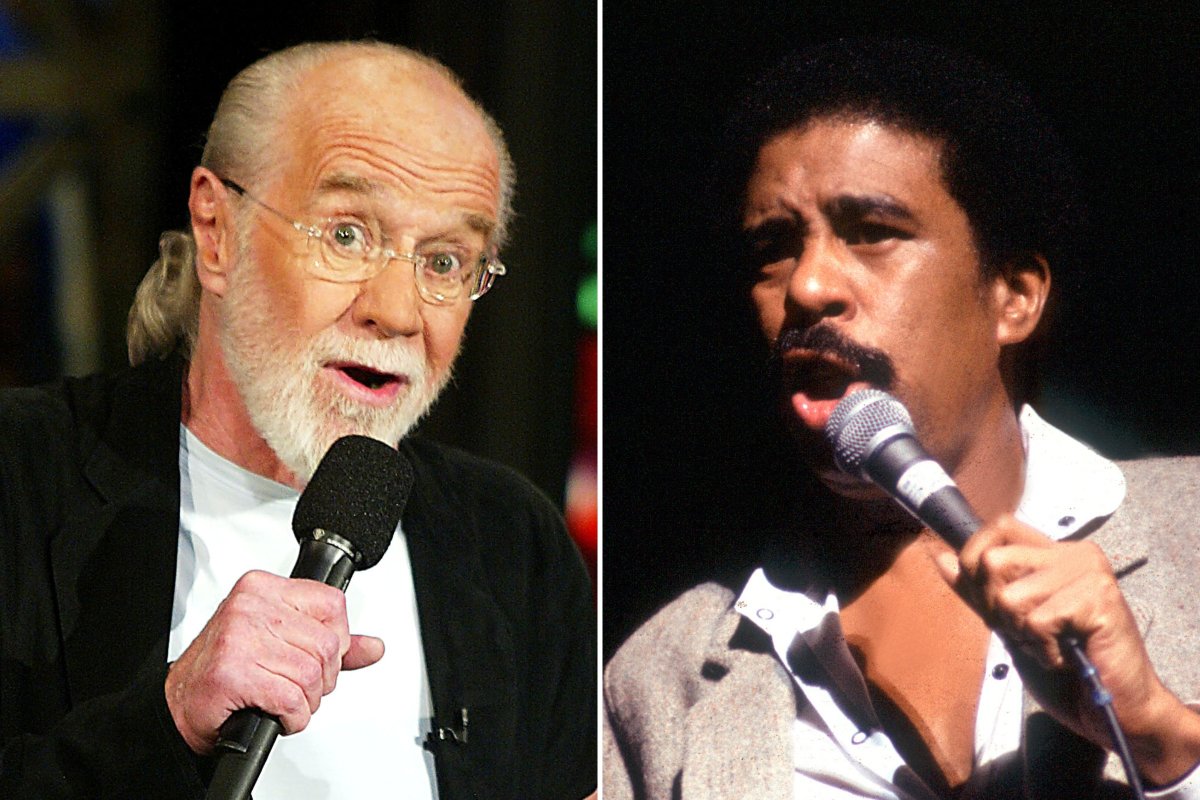Author and former MSNBC host Touré sparked a spirited, albeit brief, Twitter debate back in October 2021, when he defended Dave Chappelle from accusations that his comedic prowess had waned with his ongoing success.
At the time, Chappelle had released his Netflix special The Closer, a standup show that contained material widely branded "transphobic." Culture critic Touré, who has often spoken in defense of the LGBTQ+ community, saw the special as a crowning moment.
"Chappelle's work from The Age of Spin to The Closer [has] cemented him as the best standup ever and shown him growing from what he was before—a great joke teller—to what he is now—an elite storyteller," Touré wrote at the time.
The multimillions that Chappelle continues to rake in through his standup shows and TV specials is solid proof that Touré is far from alone in his assessment. And, if numbers are doing the talking, Joe Rogan—the jewel in Spotify's crown with the platform's most listened-to podcast—also enjoys a devoted, unwavering fanbase.
Rogan has also faced his fair share of controversy, including accusations in early 2022 that he had spread COVID misinformation and used racial slurs on his powerhouse podcast The Joe Rogan Experience. A number of musicians removed their music from Spotify in a futile him-or-us move that ended with some of the same detractors quietly returning to the platform, where Rogan's reign continues.

As with Chappelle, Rogan's star has only shone brighter after each scandalous headline and wave of social media outrage. And the unconditional champions of these stars are not their peers, but an international congregation of fans, who have taken a can-do-no-wrong approach to supporting their idols.
Where political and religious leaders once stood tall as bastions of hope to be showered in undying love and adoration, a wave of comics have worked their way into the consciousness with quippy tight 15s on matters that resonate.
Chris Rock, Trevor Noah, Chelsea Handler, Jon Stewart, Tina Fey and Kathy Griffin are just a few of today's stars who combine comedy with takes on politics and pop culture. They've become a marriage of all the things that dominate the landscape; a one-stop shop with the added bonus of delivering relatable laughs.
Louis C.K., whose downfall appeared inevitable when his past sexual misconduct offenses were revealed in 2017, continues to count himself among the comedy elite. He won a Grammy in 2022 and performed at a sold-out show at New York City's Madison Square Garden in January of this year.
While there have been cries of so-called cancel culture gravely affecting comedy, it would appear that business is very much booming.
Elevated Status
"Comedians enjoy an elevated status because they are often seen as wise figures with special insights into the society in which they participate," Evan Nierman, CEO of global PR firm Red Banyan, told Newsweek. "Many times, their jokes are tied directly to the culture of the day, which makes us feel like they understand us on a deeper level. In effect, comedians force us to look in the mirror and laugh at ourselves whether we want to or not, often facing down ugliness and hard truths."
As for how this has led to a level of worship among factions of comedy fans, Nierman, author of The Cancel Culture Curse, explained that "people with elevated status have the ability to shape public perceptions on a grand scale. This is amplified by the range and reach of mass media and social media, which can deliver messages globally in mere seconds.
"Comedians are in a unique position to command attention. Stand-up comedy, in particular, creates a dynamic where an audience is captive, forced to sit quietly and listen while the comic delivers his or her messages largely unchallenged and interrupted."
Dr. Steven Hassan, a cult and deradicalization expert who appeared on Rogan's show in 2015, says the deity status afforded to a number of today's comedians is actually a reflection of the human condition, rather than a sign of the times.
"Human beings are wired to follow leaders that they think are legitimate. And they're wired to follow the cues from their peers, or people that they identify with," he told Newsweek. "We're very social beings. And people have made the mistake of thinking that we're rational beings, but we're actually quite social and emotional beings who rationalize.
"That said, we look up in this culture to anyone who's wealthy, anyone who's famous. It tends to evoke what's called all awe. And that makes these influencers have extraordinary power to convey their ideas and their values, etcetera."
Comedians of the Past
Of course, the reverence of the comedian is nothing new. In recent decades past, the likes of Richard Pryor, Lenny Bruce and George Carlin cemented their lionized status through challenging the status quo of the time as self-styled truth-tellers. Each deftly side-tackled matters from sex to religion and the hypocrisy permeating the culture of the day via searing, subversive, sweary stage acts.
That they sparked outrage was the entire point. Artistry has, for centuries, walked hand-in-hand with controversy. The Bruces and the Pryors were merely the messengers of their time. The pearl-clutching from detractors was ridiculed by supporters with much the same tone as is delivered today by diehard fans of any artist's work: if you don't appreciate it, it's less that it's not your taste, and more that you have a problem.

This devotion continues today, not just within the comedy fanbase but also among those working in the industry. A generation of comedians, in differing ways, has attempted to emulate the shaking off of the old guard, damn-your-feelings approach to their work, collecting haters—and devout followers—along the way.
Such is the defense of any comic widely seen to have said the "wrong" thing that scrolling through social media feeds would have you believe the person at hand is little short off a martyr. "They keep trying to crucify Joe Rogan for not conforming," read one viral tweet back in November 2021, as Rogan faced COVID backlash.
Lingering Dangers
While much is made of the growing power afforded to the men and women working in comedy today, Nierman told Newsweek that the real danger lies not in what is said, but how it's received and acted upon.
"Controversial comedians from across generations, including Lenny Bruce, Andy Kaufman, Richard Pryor, George Carlin, Roseanne Barr and others, have prompted outrage, but today the danger is less seen as emanating from the stage but instead taking place upon it," he said.
"Fear that the comedians have too much power is far less of a threat than the increasing willingness of people to act out physically when offended by another person's words. That type of behavior should never be seen as acceptable, or we risk normalizing it."
This action extends to how it could affect the comedians themselves. "The danger that exists in comedy today is less about the threat the comedian poses, but the increasingly real possibility that the comic could be physically attacked for their words," Nierman noted. "Several recent examples of people storming the stage and committing assault are alarming, the most notorious of which was Will Smith's striking of Chris Rock at the Academy Awards as millions watched in shock."
The growth of social media has also brought with it an increased roster of self-made celebrities upon whose every word more fans can hitch their faith.
"We live in an era where cult status is easier to achieve owing to the internet," said Nierman. "In the past, cult-like leaders could mostly impact those with whom they were able to physically interact or whose words moved them. Today, videos are easy to produce and disseminate and charismatic figures can attract massive followings reaching anyone in the world who is connected to the web.
"Social media influencers have an outsized influence that can be highly problematic given that tens of millions of people are swayed by their opinions even if the influencers are weighing in on topics about which they have no real knowledge or are woefully unqualified to discuss with any level of intelligence or depth."
For Hassan, author of Combating Cult Mind Control, there's cause for concern when any one entity is granted unbridled authority. "Lord Acton [the British historian] said power corrupts and absolute power corrupts absolutely," he said. "And the way to protect from that is having lots of other people in your world to say, 'Hey, cut the crap,' or, 'Hey, you're too filled with yourself,' or, 'You were wrong when you said that.'"
Over the years, many comedians have used their fame and influence to back "incredibly noble and positive causes," said Nierman. "Comic Relief has for decades been an incredibly powerful force in combating global poverty. Today, comedians such as Jon Stewart have used their fame and cult-like status to support worthwhile causes, such as Stewart's efforts to advocate on behalf of U.S. veterans."
Echoing that sentiment, Hassan said: "I like Jon Stewart as a comedian who uses his influence in a socially responsible way and doesn't do puffery, where he claims to know at all and tends to want to encourage the people to be their best selves."
Burden of Responsibility
In an interview with The New York Times in 2019, Ricky Gervais addressed the notion that he should be well versed in the subjects he tackles, after he was criticized for making a joke about peanut allergies.
"People think someone joking about their issue is the worst thing in the world. [...] The audience has got to be clever enough to know when I'm playing the idiot and saying the wrong thing for comic effect," he said. "That's one of the things of comedy: laughing at the wrong thing because you know what the right thing is."
Gervais added that he was "a comedian, not a politician. My job is to be funny. If I can do that with a little intelligence and fall on the right side, that's a bonus."
Still, Nierman told Newsweek there's no getting away from the reality that with a great audience comes a host of expectations; expectations that those of an elevated standing are all but set up to fall short of.
"There is a degree of responsibility that should come with possessing a massive following, but it is simply not the case," he said. "Political polarization and the encroachment of politics into every aspect of our lives is also creating an untenable circumstance where every public figure is expected to possess an opinion and share it freely with a public that hangs on their every word.
"Cancel culture is a pervasive threat since anyone can at any time be descended upon by an online mob for doing or saying the wrong thing or having the audacity to express an unpopular opinion."
Ultimately, says Hassan, comedians offer something of a safe haven from a decidedly challenging real world.
"I think comedy is an attractive thing for people because they're so fearful," he said. "We're definitely living in a time of great uncertainty, economic uncertainty, political uncertainty... And laughter is a big release."
Uncommon Knowledge
Newsweek is committed to challenging conventional wisdom and finding connections in the search for common ground.
Newsweek is committed to challenging conventional wisdom and finding connections in the search for common ground.
About the writer
Ryan Smith is a Newsweek Senior Pop Culture and Entertainment Reporter based in London, U.K. His focus is reporting on ... Read more
To read how Newsweek uses AI as a newsroom tool, Click here.






